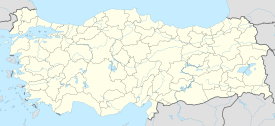Sigeion
| Σίγειον | |
| Alternate name | Sigeum |
|---|---|
| Location | Kumkale, Çanakkale Province, Turkey |
| Region | Troad |
| Coordinates | 39°58′24″N 26°10′41″E / 39.97333°N 26.17806°ECoordinates: 39°58′24″N 26°10′41″E / 39.97333°N 26.17806°E |
| Type | Settlement |
| History | |
| Builder | Colonists from Mytilene |
| Founded | 8th or 7th century BC |
| Abandoned | Between 168 BC and 23 AD |
| Periods | Archaic Greece to Hellenistic period |
Sigeion (Ancient Greek: Σίγειον, Sigeion; Latin: Sigeum) was an ancient Greek city in the north-west of the Troad region of Anatolia located at the mouth of the Scamander (the modern Karamenderes River). Sigeion commanded a ridge between the Aegean Sea and the Scamander which is now known as Yenişehir and is a part of the Çanakkale district in Çanakkale province, Turkey. The surrounding region was referred to as the Sigean Promonotory, which was frequently used as a point of reference by ancient geographers since it marked the mouth of the Hellespont. The outline of this promontory is no longer visible due to the alluvial activity of the Karamenderes which has filled in the embayment east of Yenişehir. The name 'Sigeion' means 'silent place' and is derived from Ancient Greek σιγή (sigē), 'silence'; in Classical Antiquity, the name was assumed to be antiphrastic, i.e. indicating a characteristic of the place contrary to reality, since the seas in this region are known for their fierce storms.
Sigeion was founded by the Mytilenaeans from nearby Lesbos in the 8th or 7th century BC. Towards the end of the 7th century BC, the Athenians sent the Olympic victor Phrynon to conquer Sigeion. According to tradition, Phrynon and the Mytilenaean aristocrat Pittacus fought a duel in which Pittacus won by outwitting his opponent by using a net. During this war the aristocrat and poet Alcaeus of Mytilene wrote several poems about the conflict in which he related how he had fled from battle, lost his shield, and endured the shame of the Athenians hanging it up as a trophy in their temple to Athena. Most of these poems are lost except for a few lines, and it is thought that they constituted the major source of information about the conflict for writers in Classical Antiquity.
...
Wikipedia

